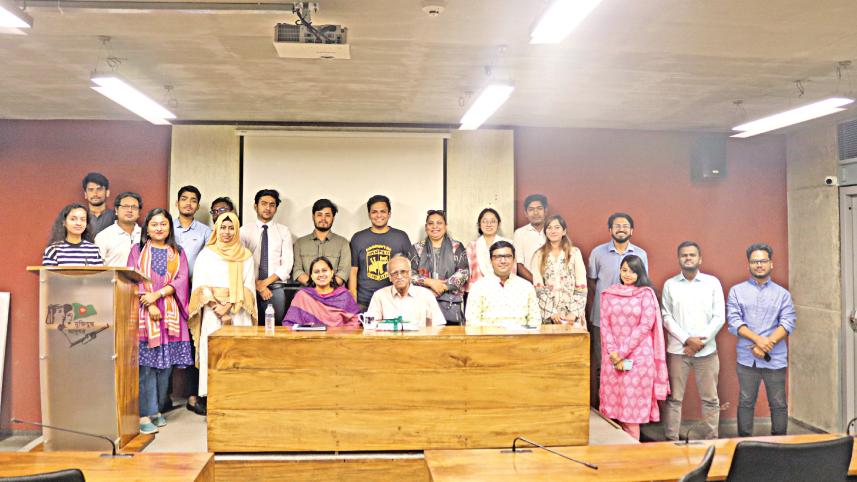CSGJ monthly lecture on the legal implications for Bangladesh hosting the refugees

On May 27, 2023, Center for the Study of Genocide and Justice (CSGJ) at the Liberation War Museum organised the ninth lecture of its monthly lecture series where Naureen Rahim, a PhD Research Fellow at the Faculty of Law, University of Oslo, gave an extensive talk on the topic 'Bangladesh as Refugee Hosting State: Legal Implications in Dealing with the Rohingyas'.
Before delving into the issue of the present Rohingya refugee crisis persisting in Bangladesh, Ms. Rahim first discussed about the historical narrative of refugees in Bangladesh. She briefly spoke about the plight of the Bengali refugees who fled to India during the 1971 Liberation War and the post-war government's dilemma regarding the Urdu speaking minorities in Bangladesh. According to her, although the Urdu speaking minorities have gradually been granted electoral right and now being treated as citizens, they still face social discrimination.
Sharing the research findings from her ongoing PhD fieldwork, Ms. Rahim opined – with reference to the UNHCR – that aside from the Rohingyas, Bangladesh is also a host to refugees from other nationalities such as Iran, Iraq and Afghanistan.
Regarding Bangladesh's decision not to ratify the 1951 Refugee Convention and its 1967 Protocol, she stated that no official document contains any justification on the non-ratification. Ms. Rahim highlighted how the limited involvement of South Asian States during the drafting of the 1951 Refugee Convention has led them to reject this Eurocentric refugee recognition practices which was drafted after the second world war to meet the European refugee crisis. However, it remains unclear whether Bangladesh's decision not to ratify the Convention and its Protocol is influenced by this historic narrative or not.
On the contrary, Ms. Rahim is of the opinion that despite not being a party to the 1951 Refugee Convention, Bangladesh is hosting the Rohingya Refugees with full respect to the international protection regime. She reflected in one judgement of the Supreme Court of Bangladesh (RMMRU v Government of Bangladesh, 2017) where the Court observed that although Bangladesh has not ratified the 1951 Convention, this Convention has by now become customary international law through state practice making it binding upon all countries of the world irrespective of whether a country has signed, acceded or ratified it.
Despite being a non-signatory state to the Refugee Convention, Bangladesh has been in association with the UNHCR's Executive Committee (ExCom) since 1995 and also with the Global Compact on Refugees (GCR) since 2018.
Ms. Rahim also talked about the lack of national law dealing with refugee crisis in Bangladesh. This gives rise to issues regarding how civil and criminal disputes are being resolved within and outside the camp areas. At present, the Constitution of Bangladesh and the Foreigners Act 1946 are the major laws that are being used for dealing with such issues whereas if the dispute concerns eruption of violence within the camp, the authorities apply the Penal Code 1860.
Lastly, Ms. Rahim discussed about the longstanding repatriation problem of the Rohingya refugees drawing upon the recent negotiation between all the concerned parties. Finally, the lecture was concluded with an active Q/A session.
- From CSGJ, Liberation War Museum.



 For all latest news, follow The Daily Star's Google News channel.
For all latest news, follow The Daily Star's Google News channel.
Comments